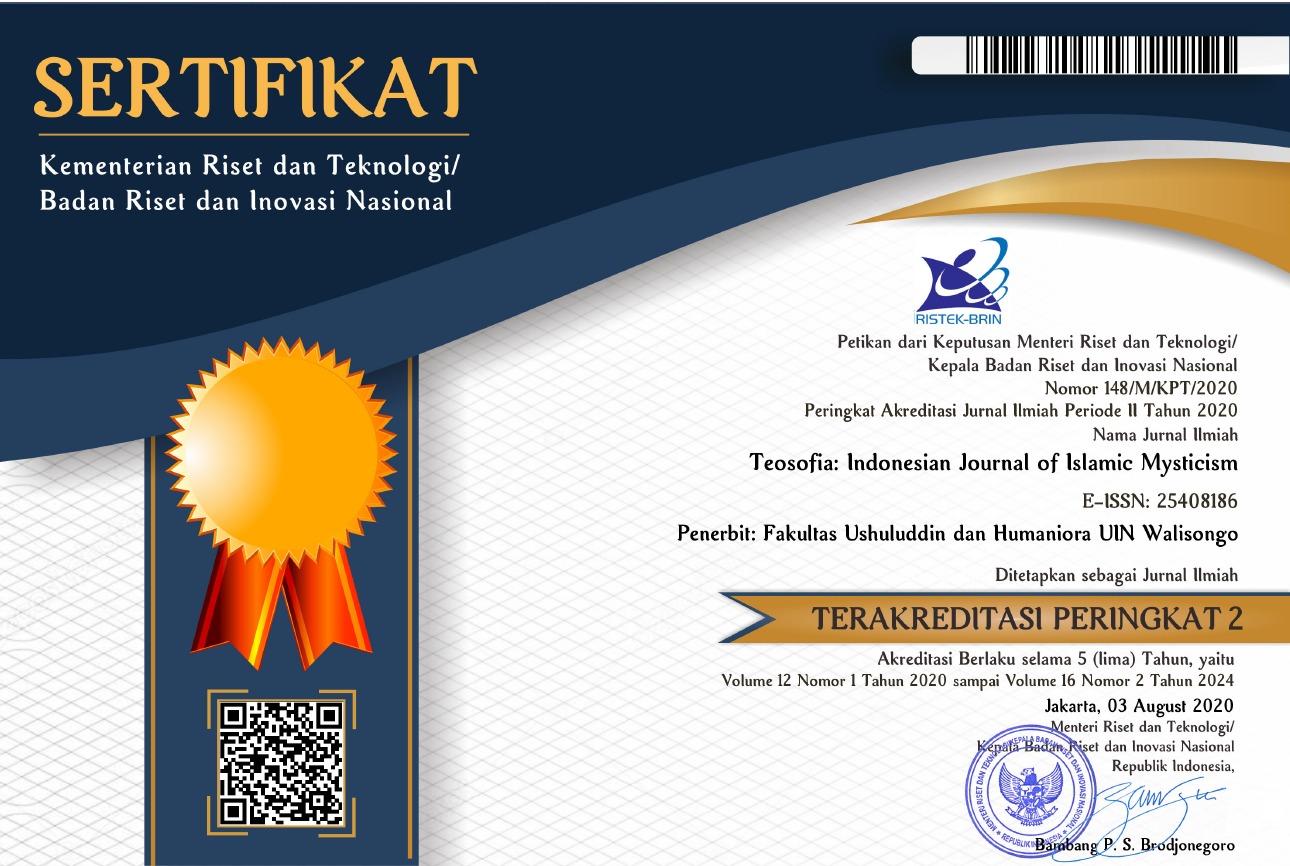ISLAMIC ETHICS BASED ON AL-QUR'AN AND MULLA ṢADRĀ’S ESCATOLOGY
DOI:
https://doi.org/10.21580/tos.v4i2.1715Keywords:
Mulla Ṣadrā, resurrection, ma'ād, eschatology, physical awakening (al ma'ād al jismānī), practical reason ('amalī), and theoretical reason (naẓarī)Abstract
Mulla Ṣadrā is one of the philosophers who provide philosophical views and answers to the principles of eschatology (ma'ād) that have not been answered by the philosophers of his predecessors. He is also known for successfully pouring his philosophical thoughts in his various commentaries on the main religious sources, both those relating to the Qur'an and ḥadīth. In this paper, there are several principles of eschatology of Ṣadrā which the writer will examine as the position of Ṣadrā in regard to post-mortal physical resurrection, the intellectual (intellectual) (intellectual), the role of the Actor (fā'il) and Action ('amal) and the relationship between resurrection (ma'ād) and ethics (Akhlāk). In the eschatology of Ṣadrā, the knowledge of eschatological matters (life akherat) has a major influence on an individual's ethical actions. This paper is also intended to show that Mulla Ṣadrā's ethics as an implication of his eschatological philosophy is synergistic with the main sources of religion; Both the Qur'an and the Hadith of the Prophet.Downloads
References
Amuli, Jawadi, Makna Hari Kiamat Dalam Al Qur’an, Jakarta: Sadra Press, 2012.
al Ḥaydarī, Kamāl, al Tarbiyah al Rūhiyah: Buḥūth fī Jihād al Nafs, Iran: Dār Farāqid, n.d..
Hude, M. Darwis, Logika Al Quran (Pemaknaan Ayat Dalam Berbagai Tema), Jakarta: EURABIA, Januari 2015.
Khamenei, Muhammad, Mulla Sadra’s Transcendent Philosophy, Tehran: Sadra Islamic Philosophy Research Institute (SIPRIn), 2004.
________, the Qur’anic Hermeneutics of Mulla Sadra, Tehran: SIPRIn Publications, 1385.
Nasr, Hossein, Ensikolpedi Tematis Filsafat Islam, Translated from: History of Islamic Philosophy, Bandung: Mizan, 2003.
___, Islamic Philosophy from Its Origin to the Present: Philosophy in the Land of Prophecy, New York: State University of New York Press, 2006.
___, Man and Nature: The Spiritual Crisis in Modern Man, Chicago: KAZI Publications, 1997.
Nur, Muhammad, Takwil dalam Pandangan Mulla Sadra, in Kanz Philosophia: a Journal for Islamic Philosophy and Mysticism, vol. 2, no. 2, December 2012.
Rustom, Mohammed, Qur’anic Exegesis in Later Islamic Philosophy: Mulla Sadra’s Tafsīr Surah al- Fātihah, University of Toronto, 2009.
______, “the nature and significance of Mulla Ṣadrā’s Qur’anic Writing”.
Ṣadrā, Mohammad al Shīrāzī, Al Ḥikmah al Mutaʿāliyah fī al Asfār al ʿAqliyah al Arbaʿah, Beirut: Dār iḥyā’ al turāth, 1981.
_____, Al Maẓāhir Al Ilāhiyyah fī Asrār al ʿUlūm al Kamāliyyah, Tehran: Bonyad Hikmat Sadra Publishers, n.d..
_____,Al Shawāhid al Rubūbiyah fī al Manāhij al Sulūkiyah, Mashhad: al markaz al jami’I li al nashr, 1981.
_____, Asrār al ’Ayāt, Tehran: Theosophy Philosophy Association, 1981.
_____,Kasr al Aṣnām al Jāhiliyyah, Tehran: Bonyad Hikmat-e Islami Sadra Publishers, 2002.
_____,Mafātiḥ al Ghayb, Tehran: Cultural Researches Institution, 1982.
_____,Majmūʿat al Rasā’il al Tisʿah (a Collection of 9 Treatises), Tehran: n.p.,n.d..
_____, Tafsīr Al Qur’ān al Karīm, Qum: Intishārāt Bīdār,1344.
Shihab, M. Quraish, Perjalanan Menuju Keabadian: Kematian, Surga dan Ayat-Ayat Tahlil, Jakarta: Lentera Hati, 2002.
Sibawaihi, Eskatologi Al Gazali dan Fazlur Rahman: Studi Komparatif Epistemologi Klasik-Kontemporer, Yogyakarta: Penerbit Islamika, 2004.
Tabātabā’I, M. Husein, al Mīzān fī Tafsir al Qur’ān, Qum: Mu’assasah al Nasr Al Islamy, 1417 H.
Al Walid, Kholid, Perjalanan Jiwa Menuju Akhirat: Filsafat Eskatologi Mulla Shadra, Jakarta: Sadra Press, 2012.
Yazdi, M. T. Mishbah, Iman Semesta: Merancang Piramida Keyakinan, Jakarta: Al Huda, 2005.
Downloads
Published
How to Cite
Issue
Section
License
Copyright
The copyright of the received article shall be assigned to the journal as the publisher of the journal. The intended copyright includes the right to publish the article in various forms (including reprints). The journal maintains the publishing rights to the published articles. Therefore, the author must submit a statement of the Copyright Transfer Agreement.*)
Licensing

This work is licensed under a Creative Commons Attribution-ShareAlike 4.0 International License.
In line with the license, authors are allowed to share and adapt the material. In addition, the material must be given appropriate credit, provided with a link to the license, and indicated if changes were made. If authors remix, transform or build upon the material, authors must distribute their contributions under the same license as the original.
_______
*) Authors whose articles are accepted for publication will receive confirmation via email and send a Copyright Transfer Agreement.









